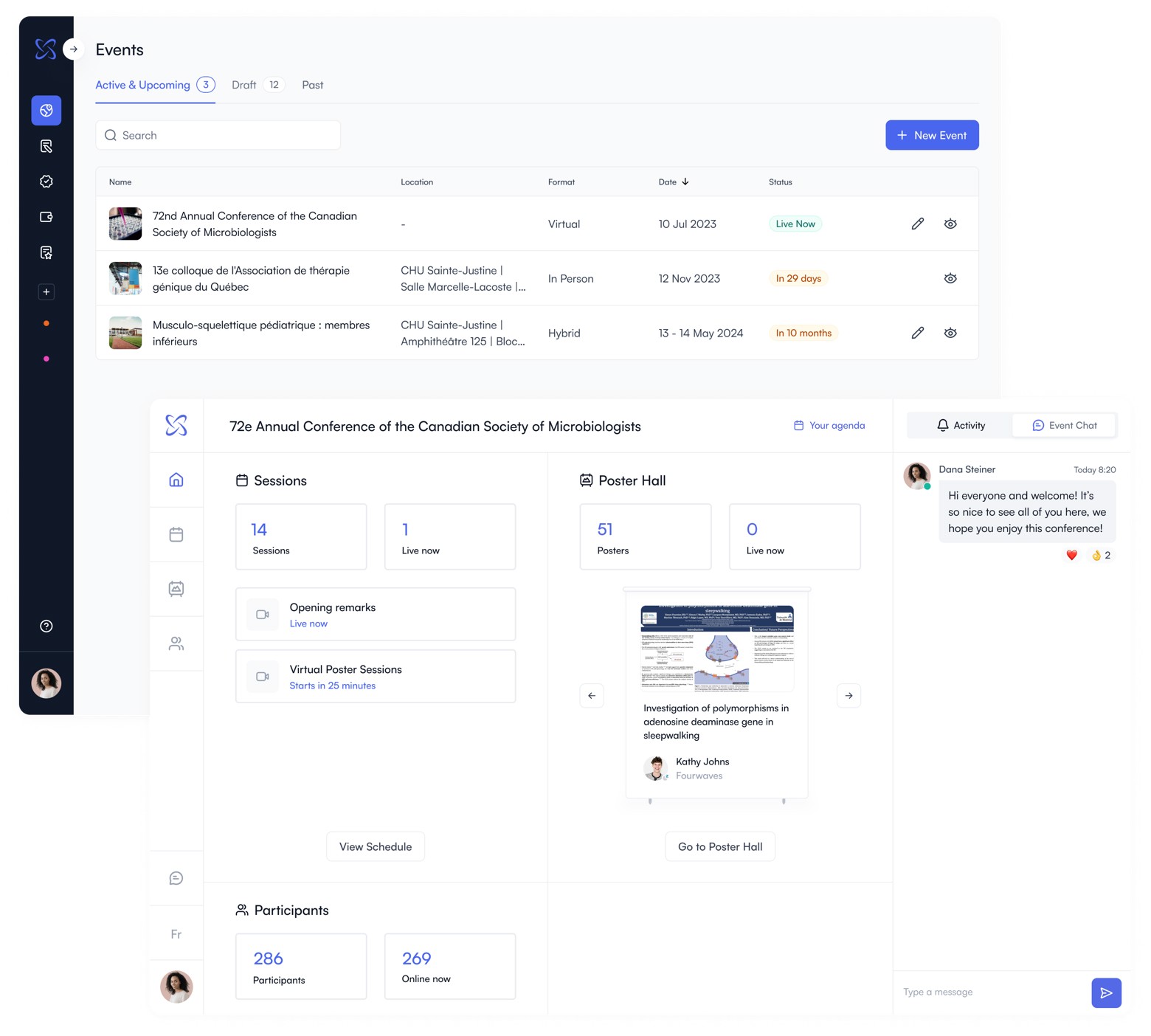Panel Discussions: What Are They and How to Organize One
Panel discussions are a dynamic and interactive way to explore a specific topic, bringing together a group of people with different perspectives to share their viewpoints in front of an audience. Whether conducted in-person or virtually, at academic conferences or webinars, panel discussions are a powerful format for engaging the audience and fostering a rich exchange of ideas.
In this ultimate guide, we'll delve into the key elements of a great panel discussion, from choosing the right panelists to facilitating audience engagement.
Let’s get right into it.
What is a panel discussion?

A panel discussion is a type of session offered at many academic conferences. It consists of a panel of experts who are given a topic to discuss, and that discussion is witnessed by an audience of conference attendees. Panel discussions generate interesting dialogue that is thought-provoking and educational for observers.
While there is a general structure to panel discussions, these sessions can be presented in a number of creative formats.
The mainstage format is usually a short session when panel members (made up of subject-matter experts who are often keynote speakers at the event) discuss a specific subject while the audience listens and observes. These panel discussions are not my favorite because they do not leave room for questions from the audience. Part of the excitement of a panel discussion is seeing how panelists respond to questions they may not have expected, whether those questions come from a moderator or the audience.
Question and answer style panel sessions bring in a moderator to pose questions to the panelists, similar to a political debate at election-time. The audience is usually given an opportunity to ask questions at the end of the session.
Presentation style sessions include a short introduction of the subject being discussed, and then each panelist has the opportunity to present their thoughts on the subject one-by-one. An audience Q&A typically follows.
The main benefits of panel discussions:
- They provide the audience with a different way of learning about a subject that is more engaging than a general research presentation
- They give conference organizers something exciting to highlight in their marketing material. A panel discussion can generate buzz about the event and increase registrations.
- They promote meaningful conversations that can spark ideas for the expansion of a research project, or the need for a new one
- They present different perspectives on a topic that the audience, and even the experts, may never have considered previously
Choose the Right Topic
The first step in planning your panel discussion is selecting the topic to be discussed. It’s important that your topic be related to the overall theme of the event, but it should also be timely and a bit controversial.
Relevance and Timeliness: Opt for a relevant topic that is timely and aligned with current trends, issues, or interests. Consider what topics are generating discussions and interest within your field or industry at the moment.
Diverse Perspectives: Aim for a topic that allows for diverse perspectives and opinions. Controversial or multifaceted subjects can generate more engaging and insightful discussions by presenting different viewpoints and encouraging healthy debate.
By prioritizing relevance, timeliness, and diversity of perspectives, you can select a panel discussion topic that resonates with your audience and fosters an enriching exchange of ideas.
Choose the Right Panelists
The success of a panel discussion hinges on selecting the right panel members.
Organizers and event planners should seek individuals familiar with the main topic and capable of presenting their points of view. But the panelists you choose should not only be subject matter experts, they should also possess the necessary skills to communicate their ideas effectively and engage with audience members.
Here's how to choose the right panelists:
Expertise
The foremost criterion for selecting panelists is their expertise in the discussion topic. They should have deep knowledge, extensive experience, or unique insights that contribute significantly to the conversation. Their qualifications should be evident through their work, research, or professional achievements.
Relevance to the Audience: Consider the interests and expectations of your target audience. The panelists should align with the audience's needs and preferences. Think about what insights or expertise would be most valuable to your attendees.
Credibility and Track Record: Research the panelists' credibility within their field and their track record as speakers or contributors to similar discussions. Verify their credentials to ensure they are authoritative voices on the topic.
Communication Skills
Effective panelists are not only knowledgeable but also skilled communicators. They should be capable of conveying their ideas clearly and concisely, making complex topics accessible to the audience. Good communication skills ensure that the discussion remains engaging and informative.
Engagement Factor: Evaluate potential panelists' ability to engage with the audience. Do they have a track record of captivating presentations or discussions? Look for individuals who can connect with the audience on an intellectual and emotional level.
Preparation: It would be difficult for anyone to communicate their opinion or thoughts clearly if they are not well prepared. Communicate the goals and expectations of the panel discussion with potential panelists in advance. Ensure they are willing to prepare adequately and stay on topic during the discussion.
Diverse Perspectives
A well-rounded panel benefits from diverse perspectives. Consider including panelists from various backgrounds, industries, or demographics. Diversity can lead to richer discussions and a broader range of viewpoints.
Balance: Strive for a balanced panel. Avoid overrepresentation from a single perspective or group. A well-balanced panel provides a more comprehensive view of the topic and fosters constructive dialogue.
The Role of the Moderator
A skilled panel moderator is crucial for a successful panel discussion. The moderator's role is to guide the conversation, keep it on-topic, and ensure all panelists have an opportunity to speak. They also act as a facilitator when it comes to audience questions during the Q&A session, making sure the discussion remains interactive and engaging.
They are responsible for:
Steering the Discussion: To maintain a successful panel discussion, it's important to avoid going off-topic. A good moderator will skillfully guide the conversation and redirect the panelists to the main topic if needed.
Balancing Speaking Time: They ensure that each panelist has an equal opportunity to contribute, preventing any one panelist from dominating the discussion. They also help the panelists respect the allotted time for their remarks.
Facilitating Audience Interaction: Moderators encourage audience questions and manage the audience Q&A session, fostering interactivity and engagement.
Setting the Tone: They establish a respectful and engaging atmosphere, encouraging open dialogue while maintaining decorum.
Summarizing Key Points: Moderators often summarize the discussion's key takeaways, reinforcing the main points for the audience.
Overall, a skilled moderator plays a critical role in ensuring that the panel discussion flows smoothly, engages the audience, and results in a meaningful exchange of ideas.
Panel Discussion Formats
Panel discussions can take on various formats, including traditional in-person sessions and virtual events or webinars.
Panel discussions can adapt to various formats, each offering unique advantages:
In-Person Panel: Traditional in-person panel discussions are effective for fostering direct audience interaction, networking, and the opportunity for attendees to connect with panelists personally.
Virtual Events: Virtual panel discussions leverage real-time technology for a global reach. They offer interactive features like live polls and social media integration, allowing attendees from diverse locations to engage actively.
The choice of format should align with the event's objectives, target audience, and logistical considerations. Each format offers distinct benefits in terms of audience reach and engagement.
Fourwaves includes all you need; event websites and registration, submission and peer-review management.
Engaging the Audience
Audience participation is a key element of an interactive panel discussion. You certainly don’t want audience members to be bored out of their minds or on their mobile phones during the whole discussion.
So here are some strategies and techniques to improve audience engagement:
Brief Introductions: Opening the discussion with brief introductions of both the panelists and the topic can set the stage for engagement. It provides context and hooks the audience's interest.
Audience Questions: Encouraging attendees to submit questions during the discussion is essential for fostering participation. It allows the audience to steer the conversation in directions that interest them the most.
Live Polls: Real-time polls offer a dynamic way to gather audience opinions and feedback on specific discussion points. These can be conducted throughout the panel to keep the audience engaged.
Social Media Integration: Encouraging the use of event-specific hashtags and social media platforms (Linkedin, X) can promote discussion and interaction among attendees and panelists.
By incorporating these strategies, panel organizers can create a vibrant and interactive atmosphere where the audience feels actively involved and valued, leading to a more enriching and memorable panel discussion.
Takeaways and Follow-Up
A great panel discussion provides valuable insights and takeaways for the audience. The discussion's key points should be summarized, and organizers can encourage further exploration by sharing relevant resources or suggesting follow-up discussions.
Takeaways: Summarize the discussion's key points and insights, reinforcing the main messages for the audience. These takeaways should distill the essence of the discussion into memorable nuggets that attendees can carry with them.
Follow-Up: Encourage further exploration by sharing relevant resources, such as articles, books, or websites, related to the discussion topic. Additionally, suggest opportunities for follow-up discussions, either in the form of webinars, workshops, or social media groups, to keep the conversation alive and allow attendees to delve deeper into the subject matter. It’s also a great opportunity to promote other parts of your event, from poster sessions to keynotes or networking activities.
This post-panel engagement not only enhances the value of the discussion but also promotes continued learning and collaboration among participants.
Ready for your panel?
Panel discussions are an all-in-one approach to exploring specific topics from various angles. Whether you're organizing an in-person panel session at an academic conference or a virtual panel discussion for your target audience on Fourwaves, following the principles outlined in this ultimate guide will help you create a great panel discussion that leaves a lasting impact.
Remember, the success of a panel discussion lies in choosing the right panelists, having a skilled moderator, engaging the audience, and staying focused on the subject matter—all of which can result in a thought-provoking and memorable event.
And if you need a platform to help organize your event, you’re in luck, Fourwaves has the solution for you.

Fourwaves event management platform
Fourwaves is a great platform for in-person and virtual events alike. You can host your panel discussion, virtual poster session, academic conference and more on Fourwaves. It also includes abstract management, peer review, an event website, and a registrations management system.
Everything you need for your academic event is right there; Try it out for free or book a demo today.


